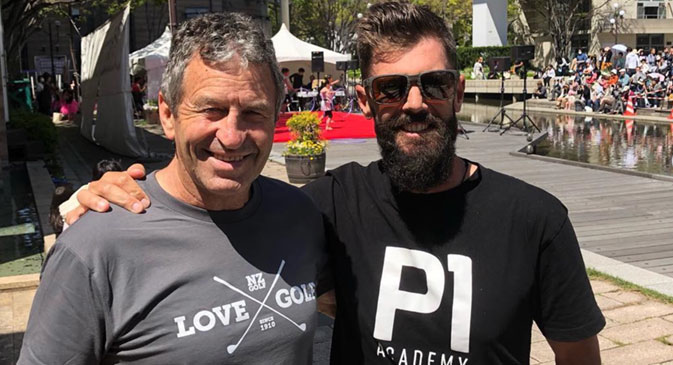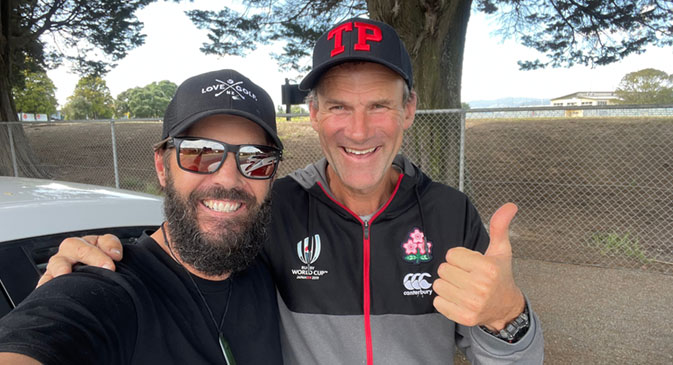Jay Carter
Jay Carter
- Coach Profile
- Golf
National Golf Coach
When Jay Carter describes his perfect day, it epitomizes his coaching and who he is.
He prioritises preparation and has a deep love of learning.
He loves connecting with his people and he really loves golf and his job.
“First, I’d get up at 5am and walk my dogs. I’d have breakfast with my family before they head off to school and work.”
What follows next would be an interview with a guest for his podcast, Talking Performance.
Then some hands-on time with his NZ Golf Academy players coaching.
To round out the day, he would re-connect with family (his amazing wife and three daughters) and reflect on the day.
“I love what I do. I can’t wait to go to work every day.”
A former golfer turned coach with a deep love of learning
“I was a failed player story in that I wanted to understand what was missing for me as a golfer. That’s why I got into coaching,” says the now Golf New Zealand National Coach.
The Golf NZ high performance pathway involves progressive phases from phase one at a district level to the highest high performance level with players such as Lydia Ko and Ryan Fox included.
Carter works at phase three on the National Development Programme and at phase four – called the Rookie Professional Assistance.
Disillusioned with other sports, Carter started playing golf at the Tauranga Golf Club with his Dad around age 12.
As a talented junior golfer he quickly moved through the ranks, playing senior provincial level and making national junior teams. He moved to Wellington in the mid 1990’s to be coached by Mal Tounge with a desire to take his game to another level.
A strong focus on his swing technique followed and Carter admits he had periods where he loved the game but at the same time was falling out of love with it, too.
Playing a round of golf in early 2000’s with his friend Chris Lethbridge, who was the General Manager of Emirates New Zealand at the time, he could see Carter was tormented by what golf had become to him and could see that he needed a break.
“He suggested I head to Dubai and work as cabin crew for Emirates.”
“Mentally I wasn’t doing well and I was still trying to compete at golf.”
“Going to Dubai for a few years was probably one of the best things I’ve done.”
In the back of Carters mind was the question of why golf hadn’t worked out as he’d planned, so he started doing some PGA coaching papers to learn more.
Coincidentally, Pete Gowen, one of the world’s best golf coaches, was living in Dubai at that time and Carter reached out to him (via a hand-written letter) asking if he could observe him coach.
Carter feels fortunate to have had time watching Gowen coach, which helped foster a deeper desire to be a golf coach.
When an opportunity arose to come back to Tauranga to coach in 2006, he jumped at it.
Deep curiosity about himself
There are pivotal moments in Carters life which have shaped him and his coaching philosophy, underpinned by a deep curiosity about how to be better.
One critical turning point, which he says he hated at the time but now can see the light, is when he got the ‘yips’ playing on the first tee of a tournament.
“All of a sudden I forgot how to move.”
When Carter was able to play, he remembers the shots he was hitting were ‘catastrophic’.
“You wouldn’t expect a beginner golfer to hit them, let alone someone playing at the level I was playing at.”
“I wanted to understand how that happened to me and why.”
Often Carter reflects that he strategically avoided risk or uncomfortable situations. Something he now challenges and works on with the golfers he coaches is making them robust under pressure by giving them the tools he’d didn’t have in his own career.
Instructor turned coach – the evolution of a philosophy of coaching
In the early days of Carter’s coaching career, he admits he was much more of an instructor than a coach. He coached how he was coached.
“Now I don’t believe in a full swing model style of coaching. We get caught up in technique and forget to look at the skill of the game.”
“I’ve seen way too many guys with pretty swings that couldn’t play. Way too many guys with ugly swings that could play.”
A big part of what Carter aims to do with his players is about connecting with them as people first.
What Carter loves about the phase that he works in is developing connections with the players. While he says you can’t really have this as a player, having former players who he’s coached want to re-connect with him when they’re in Tauranga is something he thinks is a success measure for him as a coach.
“For me, it’s about trying to help young people discover – they’ve all got it in them! It’s connecting with them so that they can strip back the noise and go for it.”
Advice to young coaches – find a mentor
In 2008 Carter met David Galbraith who gave a sports psychology talk to the national squad at 9pm one evening.
“I was thinking who the heck schedules a sports psych talk at 9pm? Then we met DG,” says Carter with a chuckle.
Clinical Psychologist and mental skills coach David Galbraith has been a huge influence on Carter as a coach. He has challenged his thinking and pushed him into the discomfort which, as a player, he admits he avoided.
One of the things that Galbraith suggested to Carter early on was that he needed a mentor as a coach.
“I provided some suggestions of people who I thought could be appropriate and David basically said no to all of them because he felt they wouldn’t challenge or scare me enough.”
Carter landed on Wayne Smith and reached out to him via a generic email address at the Chiefs and to his surprise he received an email back the next morning.
After some email exchanges, Smith invited Carter to “come to Cambridge on Friday and bring your stuff”.

Not sure about the ‘stuff’ he was supposed to bring, but sure about the opportunity, Carter spent four hours engrossed with Smith in a café.
Smith challenged among other things the traditional model of golf coaching; range-focused, as opposed to seeing the players play on the golf course. Carter left fizzing, and with some deep reflections about the way in which he coached.
Golf coaches have traditionally coached on a driving range with very consistent conditions and usually under shelter.
What Carter has realised over time was that the golf training or practice set up is not actually indicative of the reality of the game where no two shots are the same.
“The evolution now is that I enjoy learning more than coaching.”
Carter loves coaching, but at the heart of it he loves learning.
The Talking Performance podcast that Galbraith and Carter started together in May 2020 has been a vehicle for his own professional development.
The podcast (which Carter runs by himself now) has over one hundred and thirty episodes speaking to a range of high-performance sport professionals and athletes.
When Galbraith left the podcast due to other work commitments, Carter admits “there was a time where the podcast became quite prescriptive, but I’ve readjusted my style to ask the questions I want to know.”
“I have a thirst for knowledge and I’m lucky I get to learn from these amazing individuals through the podcast.”
Jay Carter thinks he’ll be a coach for life – not necessarily a golf coach, but someone who can help people unlock their potential and performance.
Despite being in a rush to try and ‘figure it all out’, he’s realised the need to slow down to go faster; lessons he wishes he could have learnt as a golfer, but he can now impart on the golfers he feels privileged to work with.
